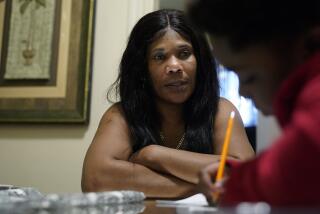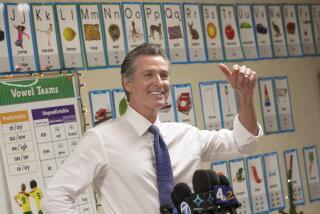Is ‘Smartest Kid’ Really the Smartest?
- Share via
What did the Romans call France?
John Hawksley, a 12-year-old who likes computers and tennis, was stumped. But Michael Jezierny, an 11-year-old who wants to design aircraft, didn’t hesitate.
“Gaul,” he said. And, with that, he laid claim to the title of “Smartest Kid in America” on a network television show featuring super bright kids going brain-to-brain. He also won a $300,000 trust fund.
But what does it really mean to be smart? Is it the ability to recall facts, such as the name of the ocean liner sunk by the Germans in 1915 (the Lusitania) or the name of the country that declared independence from Pakistan in 1971 (Bangladesh)? To spell correctly? To crunch numbers in your head? All under intense competitive pressure?
Or is it something else entirely?
It doesn’t take a genius to figure out that “Smartest Kid” is a marketing ploy designed to capitalize on the current quiz show craze that was touched off by “Who Wants to Be a Millionaire.” But its bold claim of identifying the “smartest kid” in America puts the Fox television show in the middle of a hot debate over the nature of intelligence.
While acknowledging the hype inherent in the show, which aired May 9, USC neuroscientist Irving Biederman said its method of measuring intelligence is scientifically defensible.
“Just to fire general questions of information at people and see who can respond quickly and accurately will very quickly separate bright people from non-bright people,” said Biederman.
The brain, he said, operates like the old Pac-Man video game. “You can think of the mind as a Pac-Man eating away at the world, and what it’s eating is information,” Biederman said. “If you’re not very bright, you take very small, slow bites. If you’re bright, you take in enormous chunks and you eat fast.”
Moreover, he said, the information that’s retained is--almost exclusively--information that’s understood. And smarter people understand more of what they encounter.
Those in his camp abbreviate intelligence as a “G,” for general intelligence. On the other side are those researchers who think of intelligence as multidimensional, meaning that all people have a unique combination of discrete mental strengths and weaknesses.
Dr. Mel Levine, a pediatrician based in Chapel Hill, N.C., and known for his work with children with learning difficulties, is in the latter camp. He says a show such as “Smartest Kid” equates being intelligent with having a good memory.
“It’s possible to remember things without understanding them and it’s also possible to understand things without remembering them,” he said. “I would place more emphasis on how well kids understand than how much they remember.”
Howard Gardner, the Harvard University psychologist who first posited the idea of “multiple intelligences,” in an e-mail rejected the whole premise of the show.
“To base this on Trivial Pursuit kinds of questions--rather than on, say, understanding of a scientific theory, or the ability to reason about current events, or on a sense of inventiveness or creativity, or on the ability to carry out a historical analysis--is deeply disrespectful to anyone who values the life of the mind.”
Many of the Preteens Are in College
The debate aside, the show’s contestants are obviously bright. Many of the 50 preteens chosen for the show are already in college, having aced entrance exams that require a broad vocabulary, the ability to understand reading passages and a sophisticated knowledge of algebra and geometry.
Lesley Jezierny, a computational lexicographer, and her husband, Michael, a software engineer, live in Boca Raton, Fla., with their son Michael and two younger children. She said they read to their son when he was a toddler and, though they talked about the sounds of letters, they did not deliberately try to teach him to read.
At the age of 2, he was recognizing the names of stores on delivery trucks and signs; at 3, he began reading on his own, starting with “Thomas the Tank Engine.”
He reads constantly--everything from cereal boxes to encyclopedias--and recently finished “Lord of the Rings,” the trilogy by J.R.R. Tolkien.
Although he took the ACT college entrance exam and scored in the top 2% of the nation, Michael still attends classes for gifted students at a public middle school and does not intend to leap directly to college.
Asked if she considered her son to be the smartest in America, Lesley Jezierny chuckled. “I’m very aware of the fact that the TV show tested a certain kind of thinking ability, and Michael’s particular strength is in absorbing facts and remembering where he got those facts,” she said.
So, not only did he remember the term for a type of cell division, he knew he had run across it in a science textbook while looking for something else, he told her. He recalled picking up another answer from a movie he had seen several years earlier at an IMAX theater.
Clearly, what children have learned through experience or reading plays a significant role in how well they do in such contests as well as in many types of standardized tests that are used in school. That is why critics say standardized tests of the type used in California or college entrance exams are culturally biased--because they test knowledge that some students may never have encountered.
‘Book Smart’ and ‘Street Smart’
“You can’t know the specifics of something unless you’ve been exposed to them,” said Joseph B. Hellige, a USC psychology professor and vice provost. “On the other hand, if don’t have the intellectual capacity, you won’t be able to process information in a way that allows you to remember it.”
Even in daily parlance, we use terms such as “book smart” and “street smart.” Moreover, some people are bright but cannot communicate well, so their native intelligence is not obvious.
Bob Boden, the executive producer of the show for Dick Clark Productions, acknowledged that it’s very difficult to define what it means to be smart.
Boden said the producers consulted with education experts who work with gifted children to settle on a combination of knowledge and “intuition, logic and an understanding of advanced principles” as selection criteria. They tested children all over the country and chose 50, 40 of whom were quickly eliminated.
“We’re not saying that the only component of intelligence is knowledge, but . . . the only thing you can test in the context of a television show is knowledge,” he said.
Plus, he said, there is “promotability” to a show that deals in superlatives. “Just like a show called ‘The Most Beautiful Girl in the World’ may not come up with the most beautiful girl; there’s room for other beautiful girls and other ‘smartest kids.’ ”
The show, a one-time special, had appeal. Ten million homes tuned in, making it the network’s highest-rated show since “Who Wants to Marry a Multimillionaire.”
Leading up to the final question, Michael identified the island that Greece and Turkey have fought over for 25 years, though he misspelled the name of the Greek god of fire. He also identified the factor by which volume increases when the size of a solid figure triples. And he correctly calculated the number of calories in a 30-gram portion of food if there are 300 calories in a 100-gram portion. (See answers below.)
When he won, Michael leaped into the air over and over. John, meanwhile, stood almost motionless, his face expressionless. He was consoled with a $100,000 trust.
Michael is not immodest. In an online chat after the show’s airing, he recognized that he was gifted intellectually.
But he scoffed at his new-found title. He was asked whether he honestly thought that winning proved he was the “smartest kid” in America.
And his reply proved that, indeed, he has a kind of real world smarts beyond his chronological age.
“No,” he said. “I think it proves that I’m the smartest kid in America that Dick Clark Productions could find!”
The answers to the questions above:
The island is Cyprus. The god of fire is Hephaestus. A factor of 27. Ninety calories.






